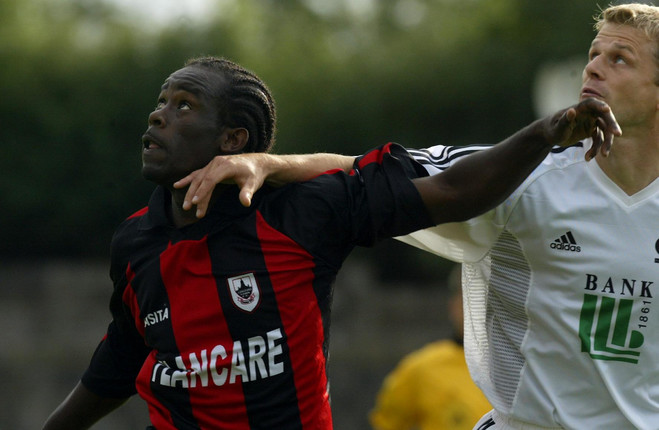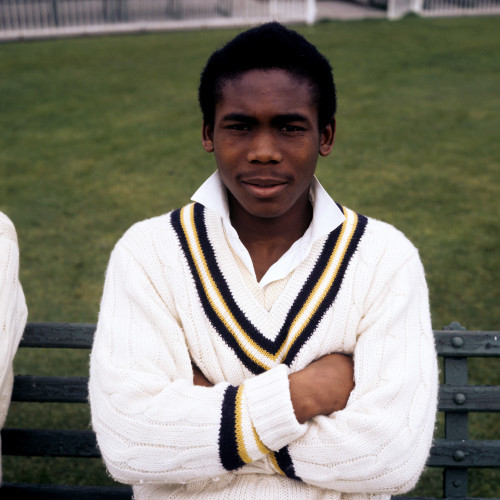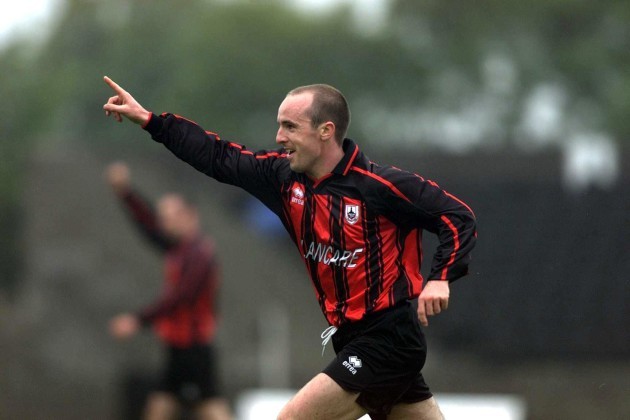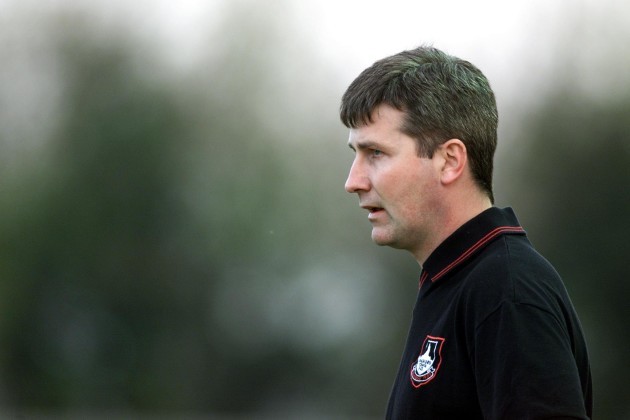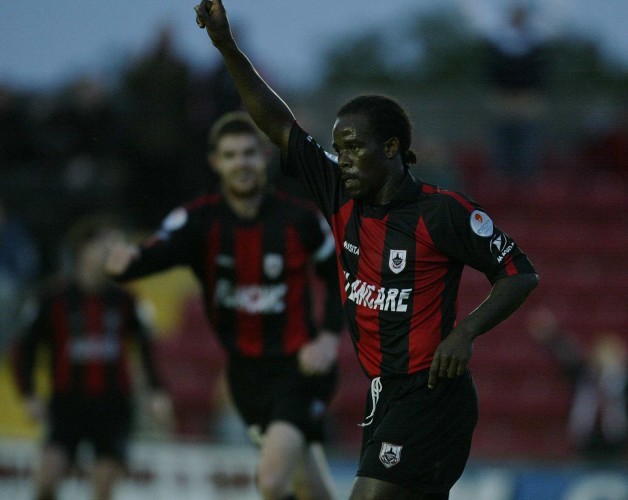BARBADOS IS NOT exactly known as a hotbed of footballing talent. In terms of sport, the country has a closer affiliation with cricket, and Eric Lavine could easily have followed this more traditional path for an aspiring athlete.
Lavine’s cousin, Gordon Greenidge, was a legendary West Indies cricketer. His sister, Pamela, also played for the West Indies women’s team, while his brother Mark represented Barbados and played in England, before tragically dying of a heart attack aged 28.
Eric too feels he might one day have been good enough to play for the West Indies, having excelled at underage level, but at 16, he chose to pursue a career in soccer.
Lavine began playing in the local leagues and was impressive enough to earn call-ups at international level, firstly for underage sides and eventually the senior team.
“There was not a lot of money in it,” he tells The42.
I would say it was a happy time, because I didn’t know any better. I’d see people play football on TV, the English league and that. Barbados is a small country and they don’t have so many people in it, but the players are very talented there.
“When you don’t have anything better than what you’re used to, you’re happy I think. But back in the day, you couldn’t make a living from football. You couldn’t.”
He continues: “It was kind of an out-of-reach thing for me, because not so many people come to visit Barbados that are really interested in football. You only really get recognised if you go to other Caribbean islands. People were coming to visit Trinidad and Tobago because they had Dwight Yorke and these players playing for them before.”
With a population of 285,000, high-profile footballers from Barbados before Lavine were almost non-existent. Defender Emmerson Boyce, who played seven seasons in the Premier League with Wigan, is probably the most recognisable Barbados international to emerge since, though he was born in England and qualifies to play for the Caribbean country through his parents.
Prior to Boyce, Gregory Goodridge had impressed after signing for Torquay United. In August 1995, he joined QPR for £250,000, but only made a handful of appearances for the then-Premier League side, subsequently going on to make over 100 appearances in the lower leagues with Bristol City.
“In Barbados, we had one professional before me and that was Gregory ‘Lalu’. He was playing at QPR, those were good times. But that was all really — there was only one player that made it kind of big.”
Some inspirational coaches helped Lavine develop as a player, while he combined football for one of the country’s most successful clubs, Pride of Gall Hill, with part-time work as a soldier. After six years playing in Barbados, he moved to Ireland. One of the coaches there knew Galway boss Don O’Riordan. Lavine and another player, Ryan Lucas, went over for a trial and both ultimately did enough to secure a transfer.
And while Lucas left Galway after two years, ultimately making the switch to American side Boston Bulldogs, Lavine stuck around for four and a half years, and acquitted himself admirably in these unfamiliar surroundings.
Prior to joining Galway, Lavine also had offers in England, but the forward has no regrets about choosing the League of Ireland over potentially competing in a more high-profile environment.
“My time in Galway I’ll never forget. It was very successful for me. Coming from Barbados, the weather was cool. But when you want something very bad and you don’t want to go back to your own country, you have to work harder than any other player living in Galway and Ireland. Barbados is miles away, so I decided I’m going to work harder than anyone, because this is my future.
“Ireland was good to me. I loved the people. They gave me the opportunity to become a professional footballer.”
With a team that also included Ricky O’Flaherty, Aubrey Dolan, Gareth Gorman, Ollie Neary and Michael Keane, Galway enjoyed some memorable days. Lavine helped the side earn promotion to the Premier Division in 1999, while they also reached the FAI Cup semi-final that year as well as the following season. They lost out on both occasions, however, against Finn Harps and Shelbourne respectively.
Lavine was settling on and off the pitch, with a mixture of his own determination and the friendliness of others ensuring the move to Ireland was a success.
My mind was set that I wanted this and I must get it. I didn’t really think about it so much. I knew I would get the chance to go back home and see everybody. I only thought about one thing — being professional and doing the best I can. That was my mindset and what pushed me really.
“I know that I’m still loved, because I still have a lot of friends in Ireland. When I was there, I was accepted like one of the Irish people, like a brotherhood. I was always open to helping everybody improve something [during] training sessions and that. That way, I became very popular. I never felt out of place, I felt right at home in Ireland. It was like Barbados to me.
“I never had racism, if I went to nightclubs or out on the street and met people from the travelling community. The way that people treat and talk to others, not being stupid, the people accept anyone for who they are — it doesn’t matter what colour you are, the way you speak to and treat people, people treated you the same way, with respect. If you wanted to be stupid to people, then people will be stupid to you. That’s how I see it and that’s how it was for me. Everyone accepted me for who I was and I never got into trouble.”
Playing football in the League of Ireland, Lavine adds, was a big step up from the standard he was used to in Barbados.
“It was a real eye opener for me to see these players that played for the Ireland U20 team and also players that came back from England. It was unbelievable to see the qualities that they had. You’re a bit older than them, but you learn from these people, seeing what they do on the pitch, how they carry themselves, how they treat themselves as professionals. You learn all the time something new — you’re not there as a footballer only, it’s a learning experience. That’s what I took onboard from these players — to be professional, because they were professional. I looked at them and modelled myself off these people.”
Gradually, Lavine improved as a footballer. In the 2000-01 season’s opening day, he remarkably scored four times in one match, as the Tribesmen beat Finn Harps. With his Galway contract expiring at the end of the campaign, however, Lavine opted to move to Longford Town. It was there that he would work with a man who turned out to be one of the biggest influences on his career — current Ireland U21 boss and soon-to-be senior manager Stephen Kenny.
Longford were far from a League of Ireland powerhouse at the time, having never won a major trophy. The previous season, they had finished eighth, five points above the relegation zone, though their potential was evident. They had reached the 2001 FAI Cup final, losing 1-0 to a Bohemians side that also won the league that season. Their runners-up medal in the competition also meant they qualified for the following season’s Uefa Cup.
Over the following four years that Lavine played for the club, they enjoyed unprecedented success. The former player believes Kenny deserves plenty of credit for putting the foundations in place, having gotten them promoted before leaving to join Bohs in December 2001, not long after Lavine joined.
I cannot compare him to Jurgen Klopp yet, but he is a real master. Stephen Kenny has qualities that I have never seen in other trainers for a long time in the League of Ireland. To work with him was a pleasure, because he could man-manage players like nobody I had ever worked with.
“When you have a Stephen Kenny, you have 14 or 15 men, because he’s always there, the power that he gives you. Longford Town, when I first got there, we were an honest team with good players and good togetherness, but what he did to get the players and the club to where it was in those times was unbelievable. For the players we had, it was unbelievable what we [achieved] as a team.
“Stephen Kenny is like a fox. He makes everything happen, he makes the right decisions, often on the pitch, what we were [doing] in training. In the dressing room, everybody thinks he’s a quiet man, but he motivates you. You wouldn’t think it, but Stephen Kenny can be very loud sometimes. It would wake you up when he’s loud, because [usually] he’s very quiet and speaks so softly. But when he is angry and something is not going right with what the players are supposed to do, he can be very angry.”
During his Longford stint, Lavine was still living in Galway with a young son there, travelling up to training, which often took place in Dublin. On the pitch, the Barbados international’s first season was troubled. The team battled relegation, finishing just a point above First Division-bound Dundalk, while they needed to beat Finn Harps 6-5 on penalties in a play-off to preserve their top-flight status.
The 2003 campaign was much more positive, however. With Alan Mathews at the helm, they finished fourth and won the FAI Cup, beating St Pat’s 2-0 at Flancare Park, as future Ireland international Keith Fahey was sent off for a reckless challenge on Sean Prunty. Sean Francis’ first-half effort deflected in off Colm Foley, before Shane Barrett sealed a first FAI Cup triumph in the club’s 79-year history in second-half stoppage time. It was an unforgettable win for an unfashionable club like Longford, and revenge on the Saints, who had beaten them in the League Cup final earlier that year, with Lavine playing in his part in the famous day, along with the likes of Vinny Perth, Barry Ferguson, Alan Kirby and Stephen O’Brien.
The build-up to the game was crazy,” Lavine recalls. “We stayed overnight in Longford. We had breakfast, walked around the town a little bit, met everybody, everybody was so hyped up about this cup final. Then we drove to the game in the evening. Alan was taking us through everything. We had this belief that we were going to win. We were out there, my mind was so free. I never heard a peep on the sideline, not even from the crowd. It’s only after the final whistle that I heard something from the people, because I was so concentrated. I didn’t even think because we were playing at home: ‘We must win this.’ We were so good, so well prepared.”
The following year, Longford did the double, winning both the League Cup and the FAI Cup, while finishing sixth in the league. Lavine was involved again in the season’s climactic showcase. It looked like it wasn’t going to be their day at Lansdowne Road, when Willie Bruton opened the scoring for Waterford. Nevertheless, two goals in the final four minutes, from Alan Kirby and Paul Keegan, ensured the holders retained the coveted trophy.
Having helped the club enjoy previously unheard-of success, Lavine opted to leave Longford and return to Galway in 2005. A new forward, Andy Myler, had been recruited, and the club wanted to invest in younger players,
But the move back to Terryland Park proved short-lived. According to an Irish Times report from the time: “Galway’s board of directors decided to release Lavine… following an internal disciplinary process.”
In May 2006, the veteran striker was snapped up by Athlone Town, 10 days after his Galway departure was confirmed.
“He is a great player, who has been successful in Ireland,” the club’s manager Michael O’Connor said at the time. “It’s good that he has decided to come to a club like Athlone.
“Everyone is saying that he had problems at Galway or whatever, but all I know is that I’ve signed a very good player. You’ll always be in the market to sign a good player.”
Of his brief second stint at Galway, Lavine says: “It didn’t work out, because sometimes the manager favoured the young players. They’re playing players that came back from injury and you were playing good football, and they want to leave you out or not even have you in the [matchday squad]. I said: ‘That’s not for me.’ I didn’t want to be a big-time Charlie or nothing, but it wasn’t for me, because I was old and I didn’t want to be sitting on the bench. That’s the end of it. I wasn’t in the team and I was training every day.
Then Athlone Town came in for me. I have no regrets playing for them, they were a great club that I have loads of respect for. I never disrespect or say anything bad about any of the clubs I played for in Ireland.”
In 2009, with his League of Ireland career finished, Lavine joined Galway Premier League side Oranmore, who were coached by his former team-mate Ollie Neary.
“It was a good run, but once you get old and younger players are coming through, you must make way for the younger players. You can’t hold them back, because you can’t live on what you have done before, you must look at the future and the future is the younger lads. You must let them play.”
Meanwhile, Lavine admits his stint as an amateur player in Galway ended on a less-than-positive note.
“It was enjoyable giving back to the community that used to [support me] in Terryland. It was great, but I had to finish up.
“We got to one semi-final. At this time, I was going to Germany. I couldn’t play, because I had to take my flight. It would have been too late. So I didn’t turn up for the game there. I think they lost. It didn’t go down too well with my friend Ollie and it didn’t go down too well hearing that they lost the game. But in life, sometimes you move on. I put these things behind me. I know it wasn’t great, but when you have to move, you have to move.”
Part of Lavine’s time in Ireland also coincided with a spell playing international football, where he came up against some top teams, including Brazil, Mexico and USA. For home matches, he would travel from Shannon to Gatwick Airport, before a nine-hour flight to Barbados. Only once during Lavine’s career did World Cup qualification look remotely possible. In 2001, they pulled off a shock 2-1 win over Costa Rica in the latter stages of qualification, though losses in their five remaining matches put paid to any hopes of reaching the following year’s tournament in Japan and Korea.
“We had one or two playing in England, but they were only playing in League Two or something. When a player like me went back home, sometimes they didn’t even want to give me a start. Although you have more experience, you don’t get a start, because they think the players at home are better than you, even though you’re the professional. It’s very strange. That was the mentality of the coaches there.”
As his career was winding down, Lavine worked for a time with the Football Association of Ireland, gaining a Youth Certificate and doing coaching work in schools.
Towards the end of his stay in Galway, Lavine met German-born Justina. The couple then moved to Aachen and married in 2012.
These days, Lavine is a coach with FV Vaalserquartier
It’s working very well. I’m learning through the experiences I had from playing. Also doing my coaching badges in Ireland helped me an awful lot. It changed me a lot as a person, it changed my lifestyle. It’s shown me a different way to deal with people, how you interact with them.”
But despite having left more than seven years ago, Ireland remains close to the 48-year-old’s heart. He keeps in touch with old team-mates, particularly Alan Kirby, who he describes as the best player he ever shared a dressing room with.
“Ireland was my little Barbados,” he adds. “It was mine, it belongs to me. I feel like I was Irish, I was treated like an Irishman. I was treated with love. I know a lot of people would say you get racism and that, but it’s not so. The people are very friendly in Galway. In Longford, the people are very friendly. In Athlone as well. I can go to Ballybofey, Glentoran, Linfield, all of these places. All I got was love, because I played football and people respected you for who you were, and how you dealt with and spoke to them.”
The42 is on Instagram! Tap the button below on your phone to follow us!
